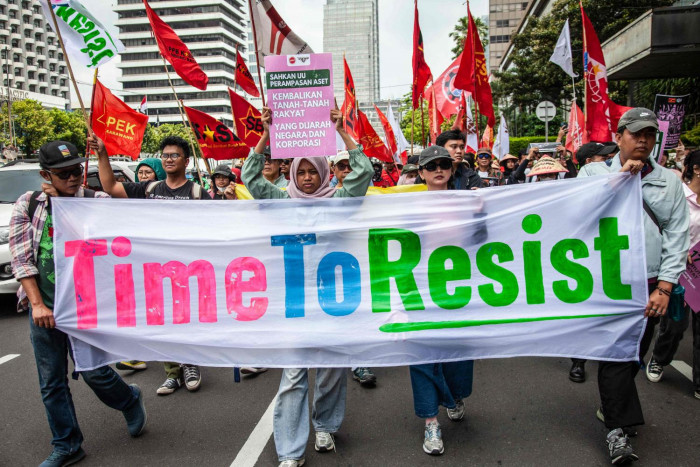The Association of Southeast Asian Nations (Asean) has relied on the domestic stability of its member states to achieve regional unity, and Indonesia, as the largest and most populous nation in the bloc, has served as the primary stabilising force.
However, the recent episodes of internal instability have raised questions about its ability to maintain this pivotal role. The current unrest in Indonesia results from public anger towards government waste, police brutality and social economic issues which create problems both internally and externally for Asean member states, by damaging democratic values, economic potential and regional security.
The present wave of protests emerged from broad public frustration over the political and economic management of the country. The public became upset when they learned about the 50 million rupiah (97,640 baht) monthly housing allowance for lawmakers, which far exceeded the national minimum wage. The situation escalated when a delivery driver died after a police car struck him during the protest, which redirected public attention from economic disparities to police brutality and state accountability. The anger reached explosive levels because of this incident, which led to property destruction and fatal clashes. The government took two steps to address public dissatisfaction — by removing lawmakers’ housing benefits and announcing an investigation into police misconduct — yet these actions do not address the fundamental problems of institutional corruption and insufficient police oversight.
The unrest did not only disrupt people’s routines, but also economic activities. The partial shutdown of Jakarta, along with several other major cities, forced many businesses to close. In an effort to control the narrative surrounding the protests and prevent people from organising more demonstrations, authorities imposed curbs on social media platforms and restricted live-streaming services.
These measures placed limitations on free speech and information access, which signals a potential deterioration of democratic values. These problems have implications which go beyond Indonesia’s borders. The political health of Indonesia as a founding member and one of the key players in Asean directly affects the stability and reputation of Asean as a whole.
First, the instability in Indonesia challenges the bloc’s standing as a gathering of democratic nations. The country’s transition to democracy in the post-Suharto era is widely seen as an example that other countries within the bloc and the wider region can learn from. Now, however, Indonesia’s democratic transition is at risk of failing altogether, as populism and the social unrest which comes along with it continue to gather pace.
The bloc should take note, because authoritarian and quasi-democratic regimes in the region, such as the ones currently in power in Cambodia, Myanmar and Thailand, now have the opportunity to use the unrest in Indonesia as “proof” that transitioning to democracy will only result in chaos. The unrest, in other words, will give these regimes an excuse to tighten their grip on power and block democratic progress in the region.
The current crisis in Indonesia also puts Asean’s status as the economic hub of Southeast Asia at risk. As the largest economy in the region, Indonesia is a crucial engine of regional growth and a magnet for foreign investment.
A nation’s internal stability functions as an indicator which helps global investors determine if the country is safe for them to operate and/or invest in. The emergence of fresh civil disturbances will trigger capital flight, which would harm economic stability and break down supply-chain networks throughout the region.
The short-term economic impact, according to Indonesian officials, will not affect stability, but the long-term perception of Indonesia as an economic partner may suffer substantial damage. This, in turn, will affect the attractiveness of the entire bloc to other international markets.
The instability also hinders Asean from upholding its collective security framework and its position as a diplomatic leader on the global stage. Indonesia is a vital mediator and security guarantor in the region, particularly in issues relating to the South China Sea.
If the unrest is allowed to continue, Jakarta won’t be able to maintain its intricate relations with its regional partners, because the government will be forced to divert its attention and resources to deal with domestic emergencies. The weakening state of Indonesia, combined with its divided attention, will create an opportunity for foreign powers to expand their influence, which in turn will complicate regional security challenges.
The protests reveal fundamental social conflicts and governmental failures which endanger national unity and diminish Indonesia’s ability to present a unified front in international affairs, thus weakening Asean’s position in Asia-Pacific diplomatic affairs. The dream of a cohesive and unified Asean community, built on shared values of peace and cooperation, is contingent upon the stability of its cornerstone member. Without a stable Indonesia, the very foundations of the Asean project are at risk.
The unrest in Indonesia poses a significant danger to Asean member states because it contributes to instability in the region, which threatens the entire organisation’s development. Public anger towards government failures and state brutality has led to both internal unrest and external instability in the region. The current situation in Indonesia, which includes democratic decline and economic instability, serves as a test for Asean because its success in handling these challenges will decide the path of its future development. The restoration of political stability in Indonesia is needed to ensure Asean as a regional organisation.


